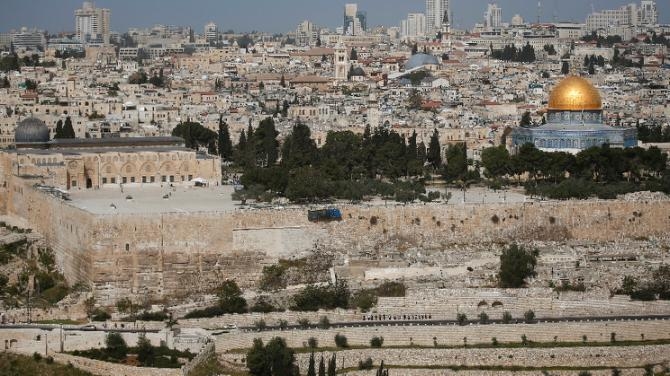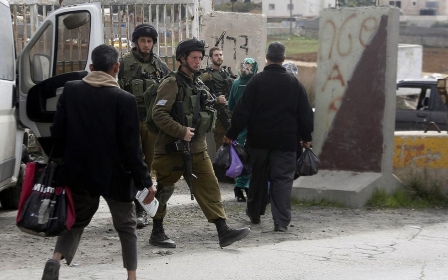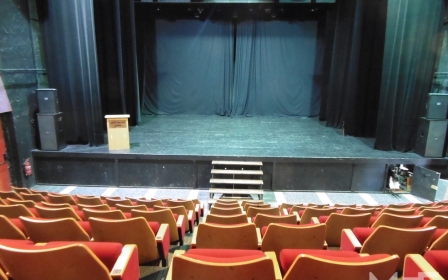Fresh Jerusalem stabbings as Israel considers next moves

An alleged stabbing at an entrance to Jerusalem's Old City and another near a bus stop on Sunday left two people wounded and an alleged attacker killed, while Israel closed a third Palestinian radio station it accused of inciting violence.
Early on Sunday, a 38-year-old Palestinian stabbed and lightly wounded an Israeli border police officer at Damascus Gate, a main entrance point for Palestinians to east Jerusalem's Old City and the site of several previous attacks, Israeli police said.
The attacker was identified as Bassem Salah from the northern West Bank city of Nablus.
Later in the morning, a foreign woman of around 30 was lightly wounded in a stabbing near a bus station in west Jerusalem and the attacker fled. Police said a Palestinian suspect was later arrested near the scene.
Further details on the victim were not immediately provided.
Violence since October 1 has left 100 dead on the Palestinian side, as well as 17 Israelis, an American and an Eritrean.
Many of the Palestinians killed have been alleged attackers, while others have been shot dead by Israeli security forces during protests or clashes.
A visit last week by US Secretary of State John Kerry failed to produce any breakthrough, and debate has intensified within Israel on whether to take conciliatory steps to ease tensions or to respond more forcefully.
Palestinian leaders blame Israel for the wave of violence, saying its continued occupation and settlement building along with a lack of progress in peace efforts have led to hopelessness among young people.
Many of the attackers have been young Palestinians, including teenagers, who appear to have acted on their own.
Radio incitement?
Meanwhile, in the flashpoint southern West Bank city of Hebron, the army shut down the Dream radio station, the third private broadcaster it has closed there, accusing it of stoking the violence.
An Israeli minister raised the threat last week of shutting down Palestinian public broadcasters as well, charging that they were guilty of fanning the flames.
Hebron, considered a West Bank stronghold of the Palestinian movement Hamas, has been the focus of much of the recent violence.
Talab Jaabari, owner of the station closed on Sunday, said soldiers arrived and seized "all the material and caused signficant damage to the station."
He said he received a written order to close for six months, which accused his station of "broadcasting programmes with the aim of promoting and encouraging terrorism against civilians and Israeli security forces."
The Al-Khalil and Al-Hurriya radio stations in Hebron were also closed earlier this month on similar grounds.
Two other Palestinian radio stations - one in Hebron and one in Jenin - said they have received letters threatening closure.
Such closures have been among a raft of security measures taken by Israel.
Last week, Israeli Prime Minister Benjamin Netanyahu announced tighter controls on Palestinian vehicles and an increase in the number of so-called "bypass roads" which create separate routes for Palestinians and Jewish settlers.
He said work permits would be withdrawn from the families of alleged attackers and there would be "no limits" on the powers of Israeli soldiers in the West Bank, where some 400,000 Jewish settlers live among 2.8 million Palestinians.
Israel has also controversially demolished the homes of alleged attackers in a bid to deter further violence.
Human rights groups say such demolitions amount to collective punishment, with family members being forced to suffer for the acts of others.
In addition, Netanyahu's government has banned the northen wing of the country's main Islamist organisation, accusing it of instigating violence. The move has been questioned by those who say the ban could further stoke tensions and harm legitimate political debate.
Middle East Eye propose une couverture et une analyse indépendantes et incomparables du Moyen-Orient, de l’Afrique du Nord et d’autres régions du monde. Pour en savoir plus sur la reprise de ce contenu et les frais qui s’appliquent, veuillez remplir ce formulaire [en anglais]. Pour en savoir plus sur MEE, cliquez ici [en anglais].




